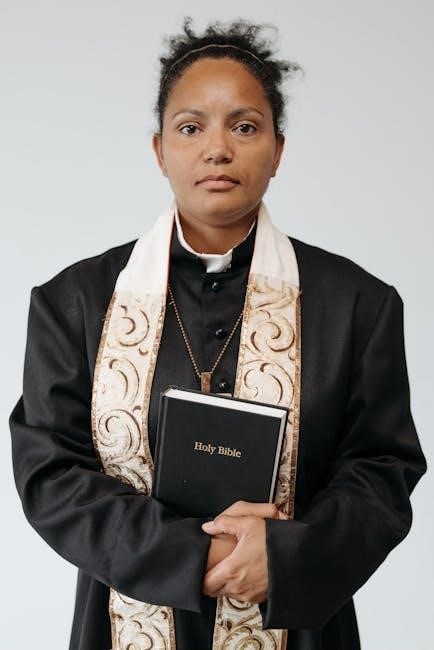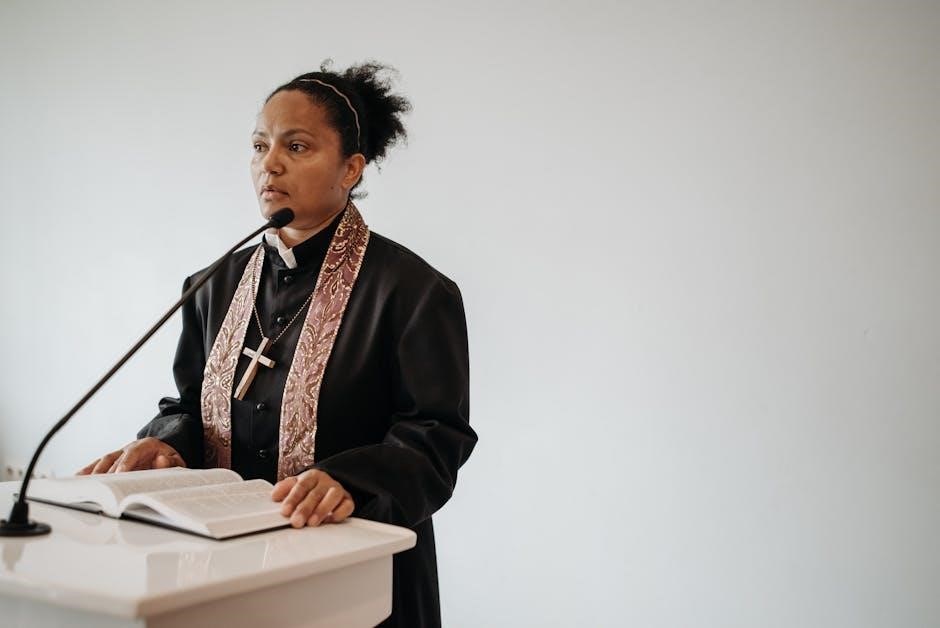sermon to encourage woman pdf
Category : PDF
Empowering women through faith is essential for their spiritual growth and resilience. Sermons tailored to encourage women provide guidance, hope, and inspiration, highlighting biblical examples of strength and divine transformation.

The Importance of Encouraging Women in Faith
Encouraging women in faith is vital for their spiritual growth and empowerment. By uplifting women through sermons and biblical teachings, we inspire them to embrace their God-given purpose and overcome life’s challenges. The Bible highlights women like Esther, Deborah, and Ruth, who demonstrated courage, leadership, and unwavering faith despite adversity. These examples remind women of their strength and potential in God’s plan. Sermons tailored to encourage women provide practical guidance, hope, and inspiration, helping them navigate modern societal pressures while staying rooted in faith. Encouraging women in faith fosters resilience, equips them to fulfill their roles, and strengthens their communities. By celebrating their achievements and supporting their spiritual journeys, we create an environment where women can thrive and serve as beacons of light in a world that often undermines their value.
The Role of Sermons in Empowering Women
Sermons play a pivotal role in empowering women by providing spiritual guidance, hope, and inspiration. Through biblical teachings, sermons uplift women, helping them discover their purpose and potential in God’s plan. They offer practical advice on navigating life’s challenges, fostering resilience and faith; By highlighting biblical examples of strong women like Esther, Deborah, and Ruth, sermons inspire women to embrace their roles with courage and confidence. These messages also address modern issues, equipping women to overcome societal pressures and thrive in their communities. Sermons serve as a powerful tool for encouraging women to grow spiritually, pursue their goals, and live fulfilling lives rooted in faith. They remind women of their value and empower them to be influential forces for good in the world.

The Biblical Portrait of a Virtuous Woman
The Bible portrays a virtuous woman as one of kindness, wisdom, and unwavering faith, exemplifying strength through her character and positive impact on family and community.
Proverbs 31: The Virtuous Woman
Proverbs 31 presents a timeless portrait of a virtuous woman, highlighting her exceptional character, wisdom, and faith. She is described as a blessing to her family, known for her kindness, generosity, and hard work. Her strength lies not only in her physical efforts but in her deep spiritual foundation, which guides her actions and decisions. The passage emphasizes her role as a wife, mother, and community member, showcasing her ability to balance multiple responsibilities with grace and integrity.

Her example encourages women to embrace their God-given talents and roles, striving to live a life of purpose and meaning. The virtuous woman of Proverbs 31 is a powerful inspiration, reminding women of their value and the impact they can have when living faithfully and compassionately.
Key Attributes of a Godly Woman
A godly woman embodies a blend of spiritual strength, moral integrity, and compassionate character. Key attributes include trust in God, self-discipline, and a heart of kindness. She prioritizes her relationship with the Lord, seeking His guidance in all aspects of life. Her speech is truthful and encouraging, reflecting wisdom and grace. A godly woman is also humble, submissive to God’s will, and dedicated to her family and community. She demonstrates faithfulness in her responsibilities, whether in the home or beyond, and her actions are marked by purity and discretion. These qualities, rooted in biblical principles, inspire others and bring glory to God. By living out these attributes, a woman becomes a powerful influence for good, reflecting Christ’s love and transforming her world through her faith and character.

Modern Applications of Proverbs 31
Proverbs 31 remains a timeless guide for women, offering practical wisdom for modern life. Its depiction of a virtuous woman emphasizes qualities like industriousness, wisdom, and compassion, which are just as relevant today. In contemporary society, these attributes translate into balancing career and family, fostering community involvement, and maintaining integrity in all endeavors. A modern godly woman can apply these principles by being a faithful steward of her talents, whether in the workplace or at home. She prioritizes her relationship with God, ensuring it influences every aspect of her life. By embracing these values, women can navigate today’s challenges with grace and resilience, becoming a positive influence in their families, workplaces, and communities. Proverbs 31 inspires women to live purposefully, demonstrating that faith and character remain the foundation of a fulfilling life.
Overcoming Adversity: The Story of the Crippled Woman
The story of the crippled woman in Luke 13 illustrates Jesus’ compassionate healing, offering hope and transformation. Her journey from bondage to freedom embodies trust in God’s divine intervention and care.
Luke 13: The Woman Bound by Infirmity
Luke 13 recounts the poignant story of a woman afflicted by a crippling condition for eighteen years. Her physical bondage mirrored the spiritual and emotional burdens many face. Jesus, moved by compassion, freed her from her infirmity, despite the synagogue leader’s objection to healing on the Sabbath. This act of divine intervention highlights Jesus’ priority of human need over legalistic traditions. The woman’s liberation serves as a powerful metaphor for spiritual freedom and the transformative power of faith. Her story encourages women to trust in God’s timing and provision, even in prolonged seasons of struggle. It reminds us that Jesus sees, hears, and cares deeply for those suffering in silence, offering hope and restoration to all who seek Him.
Jesus’ Compassionate Intervention
Luke 13 vividly portrays Jesus’ compassionate intervention in the life of a woman bound by infirmity for eighteen years. Despite her physical limitations, Jesus saw her spiritual need and acted with divine mercy. His words, “Woman, you are set free from your infirmity,” demonstrated His authority over both physical and spiritual realms. This act of healing was not just a miracle but a profound expression of God’s love for the marginalized. Jesus’ compassion challenged societal norms, emphasizing that human need surpasses religious tradition. This story inspires women today, reminding them of Jesus’ tender care and His power to liberate from all forms of bondage. It encourages faith in God’s timing and trust in His unfailing love, even in the face of prolonged struggles. Jesus’ intervention offers hope, restoration, and a glimpse of His heart for those who suffer.
Lessons from Her Journey to Healing
The crippled woman’s journey to healing in Luke 13 offers profound lessons for women today. Her eighteen years of suffering highlight the importance of perseverance and trust in God’s timing. Despite her physical bondage, she remained present in her community, demonstrating unwavering faith. Jesus’ compassionate intervention not only healed her body but also restored her dignity and purpose. This story teaches women to trust God’s plan, even in prolonged struggles, and to remain open to divine encounters. It also emphasizes the transformative power of faith and the importance of community support. Her healing serves as a reminder that God sees, hears, and cares deeply for those who suffer. This narrative encourages women to hold onto hope, knowing that God’s timing is perfect and His love is unfailing. Her journey inspires resilience, faith, and trust in God’s redemptive power.

Women of Faith in the Bible
The Bible highlights women like Esther, Deborah, and Ruth, who exemplified courage, leadership, and loyalty. Their stories inspire women to trust God and live faithfully despite challenges.
Esther: Courage in the Face of Adversity
Esther’s story is a powerful example of courage and faith in the face of overwhelming adversity. As a Jewish woman in a Persian kingdom, Esther risked her life to intercede for her people when they faced persecution. Her bravery in approaching King Ahasuerus, despite the danger, demonstrates unwavering trust in God’s plan. Esther’s journey from obscurity to royalty was not for personal gain but to fulfill a divine purpose. Her actions remind women that their faith can lead to extraordinary impact, even in challenging circumstances. Esther’s story teaches the importance of prayer, fasting, and reliance on God’s sovereignty. It encourages women to step out in courage, trusting that God equips them to face any adversity. Her legacy inspires women to stand firm in their faith, knowing that their lives can be instruments of divine intervention and transformation.

Deborah: A Leader and Prophetess
Deborah, a prophetess and judge of Israel, exemplifies extraordinary leadership and faith. She was uniquely called by God to guide His people during a time of oppression. Deborah’s courage and trust in God led her to deliver a pivotal message to Barak, instructing him to lead the army against their enemies. Her faith in God’s promises gave her confidence, even when others hesitated. Deborah’s leadership resulted in a decisive victory, bringing peace to Israel for forty years. Her story highlights the importance of trusting God’s plan and embracing the roles He assigns. Deborah’s legacy encourages women to step into leadership with confidence, knowing that God equips them for greatness. Her life serves as a testament to the transformative power of faith and obedience, inspiring women to trust God’s calling and lead with courage and wisdom.
Ruth: Loyalty and Devotion
Ruth, a Moabite woman, stands as a remarkable example of unwavering loyalty and devotion. Despite facing widowhood and cultural barriers, Ruth chose to remain with her mother-in-law, Naomi, declaring, “Your people shall be my people, and your God, my God” (Ruth 1:16). Her commitment transcended family ties, reflecting a deep trust in God’s providence. Ruth’s faith and perseverance led her to integrate into a new community, where she found favor with Boaz, ultimately becoming part of the lineage of King David and Jesus Christ. Her story illustrates the power of loyalty, hard work, and faith in the face of adversity. Ruth’s journey reminds women of the importance of standing firm in their convictions and trusting God’s plan, even in uncertain circumstances. Her legacy is a testament to the transformative impact of devotion and faithfulness.
Mentorship and Discipleship
Mentorship and discipleship are vital for spiritual growth, guiding women to embrace their roles with wisdom and grace, fostering a community of support and faith-driven transformation.
Titus 2:3-5: The Role of Older Women
Titus 2:3-5 emphasizes the vital role of older women in mentoring younger women in faith and life. They are called to teach with integrity, modeling self-control, purity, and kindness. These verses highlight the importance of holistic discipleship, where older women guide younger women in loving their husbands, children, and homes. The passage underscores the need for wisdom, compassion, and a life lived according to God’s Word. Older women are encouraged to share their experiences and spiritual insights, fostering a supportive community. This mentorship not only strengthens individual lives but also builds a stronger, faith-driven generation. By fulfilling this role, older women embody God’s plan for discipleship, leaving a lasting legacy of faith and virtue.
The Importance of Mentorship in Faith
Mentorship plays a pivotal role in fostering spiritual growth and resilience among women. By sharing wisdom, experiences, and biblical truths, mentors provide guidance that empowers women to navigate life’s challenges with faith and confidence. Titus 2:3-5 highlights the importance of older women teaching younger women, emphasizing the need for integrity, self-control, and kindness. Mentorship creates a supportive environment where women can grow in their relationship with God and develop practical life skills. It also fosters a sense of community, helping women feel valued and equipped to fulfill their roles in their families, churches, and society. Through mentorship, women can learn to trust God’s plan, embrace their unique calling, and live out their faith with purpose and joy. This timeless principle remains essential for building a strong, faith-driven generation of women.
Practical Steps for Effective Mentorship
Effective mentorship begins with a genuine investment in the lives of others. Older women are called to guide younger women in living godly lives, teaching them to love their husbands, children, and homes (Titus 2:3-5). This involves modeling integrity, self-control, and kindness. Mentors should create a supportive environment where open conversations and mutual encouragement thrive. Regular prayer and Bible study together foster spiritual growth. Setting clear goals and accountability helps mentees stay focused on their faith journey. Encouraging community involvement and service also strengthens their commitment to living out their faith. By providing practical wisdom and emotional support, mentors empower women to overcome challenges and fulfill their God-given purposes. This intentional discipleship not only transforms individual lives but also builds a stronger, more compassionate faith community for future generations.
The Power of Prayer and Praise
Prayer and praise are powerful tools for women’s empowerment. They provide strength, transform lives, and inspire faith, as seen in biblical examples of devoted women who glorify God.
The Transformative Power of Praise
Praise holds immense power to transform lives, uplifting women in their spiritual journeys. It shifts focus from life’s challenges to God’s sovereignty, fostering joy and strength. Through praise, women can express gratitude, deepen their faith, and find hope in difficult times. Biblical examples, such as Miriam and Mary, demonstrate how praise glorifies God and inspires others. Praise also creates a sense of community, uniting women in worship and mutual encouragement. By prioritizing praise, women can cultivate a positive outlook, trust God’s plan, and experience His presence more profoundly. This transformative practice empowers women to live with resilience, confidence, and a heart centered on Christ, reflecting His love and light in their lives and communities.
Prayer as a Source of Strength
Prayer is a powerful lifeline for women, providing strength and comfort in times of uncertainty. It serves as a direct communication with God, fostering a deeper relationship and trust in His plan. Through prayer, women can find peace amidst challenges, gaining clarity and courage to navigate life’s difficulties. The Bible emphasizes prayer’s role in building resilience, as seen in the story of the crippled woman in Luke 13, whose encounter with Jesus symbolizes liberation through faith. Prayer also unites women in community, creating a support system rooted in shared faith. By prioritizing prayer, women can experience God’s presence, drawing strength from His promises and provision. This spiritual practice empowers them to face adversity with confidence, trusting in God’s sovereignty and finding hope in His unwavering love and care.

Biblical Examples of Prayerful Women
The Bible offers inspiring examples of women who found strength and guidance through prayer. Hannah, though childless, prayed fervently for a son, and her faith was rewarded with Samuel, a leader in Israel. Mary, the mother of Jesus, exemplified a prayerful heart, trusting God’s plan even in uncertainty. The persistent widow in Luke 18 teaches the importance of relentless prayer, showing how faith can move mountains. These women demonstrate how prayer fosters intimacy with God and equips women to face life’s challenges with courage. Their stories remind us that prayer is not just a request but a deepening of our relationship with God. By emulating these biblical examples, women today can find strength, wisdom, and peace in their own journeys, trusting in God’s faithfulness and love.


Building Self-Esteem and Combating Negative Self-Talk
Building self-esteem through faith involves embracing God’s unconditional love and acceptance. Scriptures like Psalm 139:14 and Philippians 4:13 remind us of our worth and strength in Him, combating negative thoughts.
Biblical Strategies for Healthy Self-Image
The Bible offers timeless wisdom for cultivating a healthy self-image rooted in faith. Emphasize God’s unconditional love and acceptance, as seen in Psalm 139:14, which reminds us of our inherent worth. Encourage women to meditate on verses like Philippians 4:13, highlighting strength through Christ. Teach the importance of self-reflection and prayer, fostering inner strength and resilience. Surrounding oneself with a supportive Christian community can also bolster faith and encourage positive self-perception. Remind women that their value is not determined by external factors but by their identity as children of God. By embracing these biblical truths, women can overcome self-doubt and build a confident, God-centered self-image that transforms their lives and empowers them to live purposefully.
The Role of Community in Support
A supportive community plays a vital role in empowering women spiritually and emotionally. Surrounding oneself with like-minded believers fosters resilience, providing a network of encouragement and accountability. The Bible emphasizes the importance of collective worship and shared experiences, as seen in Titus 2:3-5, where older women are encouraged to mentor younger ones. This intergenerational support helps women navigate life’s challenges with wisdom and grace. By sharing experiences and wisdom, communities create a safe space for women to grow in faith and confidence. Collective prayer, fellowship, and mutual upliftment strengthen individuals and the community as a whole. A united and supportive community not only glorifies God but also equips women to live purposefully, embracing their roles with courage and joy.
